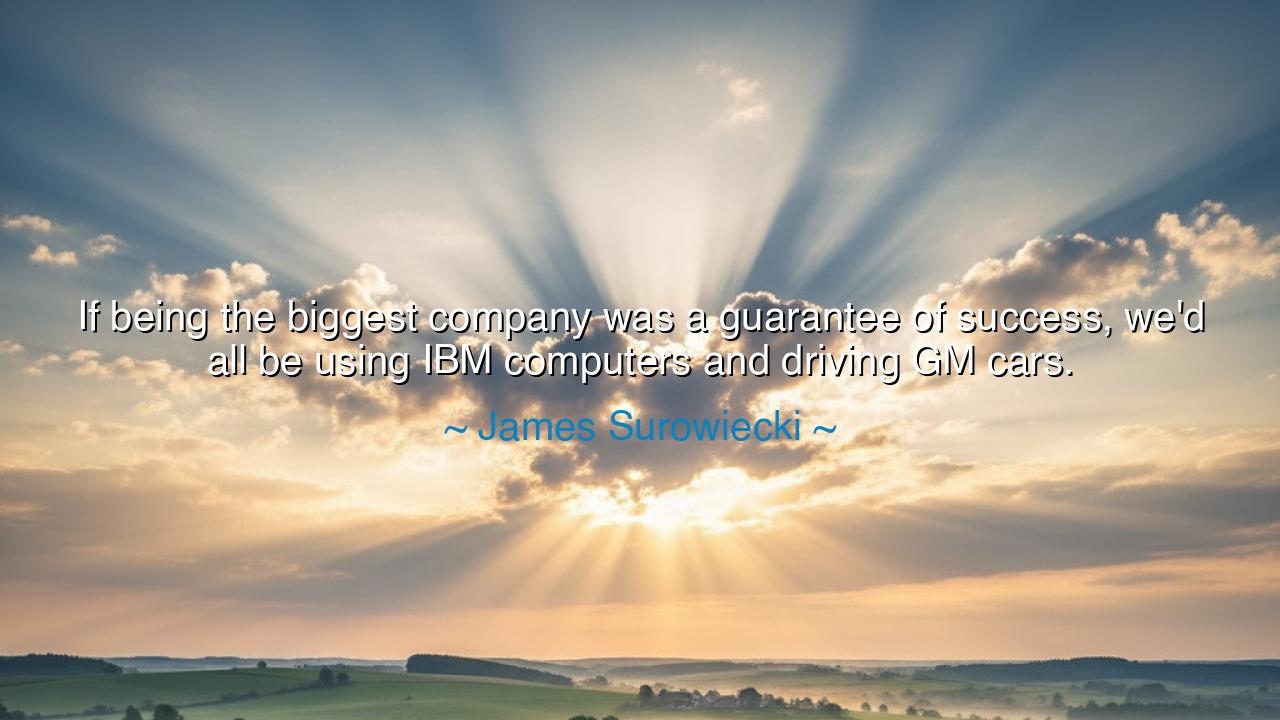
If being the biggest company was a guarantee of success, we'd all
If being the biggest company was a guarantee of success, we'd all be using IBM computers and driving GM cars.






In the eternal battle of ambition and achievement, there is a timeless truth that resonates deeply across all eras of human history. James Surowiecki once remarked, “If being the biggest company was a guarantee of success, we’d all be using IBM computers and driving GM cars.” These words strike at the very heart of the modern world, where the size of a company, its market dominance, and its apparent power often belie the true forces that drive success. Surowiecki's insight is a reflection on the fallacy that size alone—whether in business, power, or influence—can ensure enduring success. It is a reminder that in the dance of progress and innovation, it is not the largest that always prevails, but the most adaptable, the most innovative, and the most responsive to the changing tides of history.
In the ancient world, empires rose and fell on the strength of their leadership, their vision, and their ability to adapt to the ever-changing world around them. Rome, once the largest empire the world had ever known, did not fall because its size failed; rather, it faltered when it failed to innovate, to adapt, and to respond to the shifting needs of its people and its circumstances. Julius Caesar, in his time, understood that success was not merely about commanding the largest army or holding the most territory, but about flexibility and the ability to move with the ever-changing demands of power. His recognition of the need to stay in step with the changing tides of leadership was what set him apart from the mere bureaucrats of Rome, ensuring his name would be remembered long after his time.
The lesson of this ancient truth is echoed in Surowiecki's words: size alone does not guarantee the longevity of an empire, a corporation, or a person’s success. Consider the rise of Apple, once a small player in the world of technology, outpacing IBM—once the behemoth of personal computing—by focusing not on sheer size but on innovation, design, and a deep understanding of the consumer's evolving needs. In a world where IBM dominated the tech industry in the 1980s, it was Apple’s ability to adapt to the future that allowed it to grow into the juggernaut it is today. This serves as a powerful reminder that success is not solely about being the biggest or the most established; it is about understanding the forces of change and responding to them with vision and action.
Similarly, in the world of automobiles, the General Motors corporation once stood at the pinnacle of industrial success, dominating the market for much of the 20th century. However, GM’s failure to innovate and respond to the changing desires of consumers—particularly in the face of rising concerns about fuel efficiency and environmental sustainability—led to its decline. Meanwhile, Toyota, a company that had far less power and presence in the market, responded to these shifts with groundbreaking designs and fuel-efficient cars, ultimately taking the lead in the industry. GM’s downfall, much like IBM’s in the personal computer market, was not because it was too large, but because it failed to adapt, to innovate, and to respond to the changing winds of the market.
The lesson here is one of humility and innovation. In the ancient world, Alexander the Great’s empire fell apart not because it was too large, but because his successors failed to innovate, to maintain the unity and vision he had instilled. Likewise, today’s corporations, no matter how large or powerful, face the same fate if they do not adapt to new challenges, embrace change, and engage in continuous innovation. Size, in and of itself, is not a guarantee of success; it is the capacity to learn, to grow, and to remain responsive to the needs of the world that ensures lasting success.
In our personal lives, we can take this wisdom and apply it by recognizing that growth does not come solely from accumulating wealth, resources, or power. Instead, we must focus on continuous learning, adapting, and innovating in our own journeys. Whether in our careers, relationships, or pursuits of personal growth, we must be willing to embrace change and flexibility. By cultivating an ability to see the world from new perspectives, by constantly questioning and adapting, we can continue to evolve and thrive, no matter how much the world around us shifts.
Thus, let us walk the path of humility and vision, knowing that success is not guaranteed by size or dominance, but by the ability to innovate, to adapt, and to embrace the winds of change. Let us take the lessons of history—from the fall of empires to the rise of corporations—and apply them in our own lives, building not just for the moment, but for the long future, with vision, purpose, and a willingness to change. Only then will we ensure that we are prepared for the challenges that lie ahead, and can build a legacy of true and lasting success.






AAdministratorAdministrator
Welcome, honored guests. Please leave a comment, we will respond soon